NAKBA 2.0 UPDATES
May 25, 2024

A Palestinian boy stands amid the rubble of a destroyed house in central Gaza
Rafah – Israel bombed the Gaza Strip, including Rafah, on Saturday, a day after the top UN court ordered it to halt military operations in the southern city as efforts get underway in Paris to seek a ceasefire in the war sparked by Hamas’s October 7 attack.
The International Court of Justice (ICJ) also demanded the immediate release of all hostages still held by Palestinian militants, hours after the Israeli military announced troops had recovered the bodies of three more of the captives from northern Gaza.
The Hague-based court, whose orders are legally binding but lack direct enforcement mechanisms, also ordered Israel to keep open the Rafah crossing between Egypt and Gaza, which it closed earlier this month at the start of its assault on the city.
Israel gave no indication it was preparing to change course in Rafah, insisting that the court had got it wrong.
“Israel has not and will not carry out military operations in the Rafah area that create living conditions that could cause the destruction of the Palestinian civilian population, in whole or in part,” National Security Adviser Tzachi Hanegbi said in a joint statement with Israel’s foreign ministry spokesman.
The Palestinian militant group Hamas, which has ruled Gaza since 2007, welcomed the ICJ ruling on Rafah but criticised its decision to exclude the rest of war-torn Gaza from the order.
– ‘Nothing left here’ –
Hours after the ICJ ruling, Israel carried out strikes on the Gaza Strip early Saturday while clashes between the Israeli army and the armed wing of Hamas continued.
Palestinian witnesses and AFP teams reported Israeli strikes in Rafah and the central city of Deir al-Balah.
“We hope that the court’s decision will put pressure on Israel to end this war of extermination, because there is nothing left here,” said Oum Mohammad Al-Ashqa, a Palestinian woman from Gaza City displaced to Deir al-Balah by the war.
“But Israel is a state that considers itself above the law. Therefore, I do not believe that the shooting or the war will stop other than by force,” said Mohammed Saleh, also met by AFP in the central Gaza Strip city.
In its keenly awaited ruling, the ICJ said Israel must “immediately halt its military offensive, and any other action in the Rafah Governorate, which may inflict on the Palestinian group in Gaza conditions of life that could bring about its physical destruction in whole or in part”.
It ordered Israel to open the Rafah crossing for humanitarian aid and also called for the “immediate and unconditional release” of the hostages held by Hamas in Gaza.
The Gaza war broke out after Hamas’s October 7 attack resulted in the deaths of more than 1,170 people, mostly civilians, according to an AFP tally based on Israeli official figures.
Militants also took 252 hostages, 121 of whom remain in Gaza, including 37 the army says are dead.
Israel’s retaliatory offensive has killed at least 35,800 people in Gaza, mostly women and children, according to the Hamas-run territory’s health ministry.
The Israeli military said the three hostages whose bodies were recovered in north Gaza on Friday — Israeli hostage Chanan Yablonka, Brazilian-Israeli Michel Nisenbaum and French-Mexican Orion Hernandez Radoux — were “murdered” during the October 7 attack and their bodies taken to Gaza.
– Paris meetings –
The court order comes ahead of separate meetings on the Gaza conflict in Paris between the CIA chief and Israeli representatives on one side and French President Emmanuel Macron and the foreign ministers of four key Arab states on the other.
Ceasefire talks involving US, Egyptian and Qatari mediators ended shortly after Israel launched the Rafah operation, though Prime Minister Benjamin Netanyahu’s office this week said the war cabinet had asked the Israeli delegation “to continue negotiations for the return of the hostages”.
CIA chief Bill Burns was expected to meet Israeli representatives in Paris in a bid to relaunch negotiations, a Western source close to the issue said.
Separately, French President Emmanuel Macron received the prime minister of Qatar and the Saudi, Egyptian and Jordanian foreign ministers on Friday “to press for a ceasefire”, according to Cairo.
The French presidency said they held talks on the Gaza war and ways to set up a Palestinian state alongside Israel.
The five countries discussed “the effective implementation of the two-state solution”, it added.
Top US diplomat Antony Blinken also spoke with Israeli war cabinet minister Benny Gantz about new efforts to achieve a ceasefire and reopening of the Rafah border crossing as soon as possible, Washington said.
– ‘End this nightmare’ –
Israeli ground troops started moving into Rafah in early May, defying global opposition.
Troops took over the Palestinian side of the Rafah border crossing with Egypt, further slowing sporadic deliveries of aid for Gaza’s 2.4 million people.
But on Friday, Egyptian President Abdel Fattah al-Sisi agreed in a call with his US counterpart Joe Biden to allow UN aid through the other entry point into southern Gaza, the Kerem Shalom crossing from Israel, the White House said.
The US military has also installed a temporary jetty on the Gaza coast to receive aid by sea that a UN spokesman said had delivered 97 trucks of aid after “a rocky start” a week ago.
The security and humanitarian situation in the territory remains alarming, with a risk of famine, hospitals out of service, and around 800,000 people, according to the United Nations, having fled Rafah in the last two weeks.
UN humanitarian chief Martin Griffiths said the situation had reached “a moment of clarity”.
“Aid workers and UN staff must be able to carry out their jobs in safety,” he posted on social media site X late Friday.
“At a time when the people of Gaza are staring down famine… it is more critical than ever to heed the calls made over the last seven months: Release the hostages. Agree a ceasefire. End this nightmare.”
Food bound for Gaza rots in the sun as Egypt's Rafah crossing stays shut

Heavy machinery is used to dispose of rotten eggs, part of aid packages for Gaza that had gone bad as Rafah crossing remains closed, amid the ongoing conflict between Israel and the Palestinian Islamist group Hamas, in Rafah, Egypt on May 22, 2024.
PHOTO: Reuters
AL-ARISH — Some of the food supplies waiting to enter the Gaza Strip from Egypt have begun to rot as the Rafah border crossing remains shut to aid deliveries for a third week and people inside the Palestinian territory face worsening hunger.
Rafah was a main entry point for humanitarian relief as well as some commercial supplies before Israel stepped up its military offensive on the Gazan side of the border on May 6 and took control of the crossing from the Palestinian side.
Egyptian officials and sources say humanitarian operations are at risk from military activity and that Israel needs to hand the crossing back to Palestinians before it starts operating again.
Egypt is also worried about the risk of Palestinians being displaced from Gaza.
On Friday (May 24), Egypt and the US agreed to send aid via Israel's nearby Kerem Shalom crossing until legal arrangements are made to open Rafah from the Palestinian side, the Egyptian presidency said.
That could ease the backlog of aid on the road between the Egyptian side of the crossing and the town of al-Arish, about 45 km (28 miles) west of Rafah and an arrival point for international aid donations, though too late to save some food supplies.
Read Also

WORLD
Israel defiant after World Court ruling on Gaza, vows to continue fighting
One truck driver, Mahmoud Hussein, said his goods had been loaded on his vehicle for a month, gradually spoiling in the sun. Some of the foodstuffs are being discarded, others sold of cheap.
"Apples, bananas, chicken and cheese, a lot of things have gone rotten, some stuff has been returned and is being sold for a quarter of its price," he said, crouching under his truck for shade.
"I'm sorry to say that the onions we're carrying will at best be eaten by animals because of the worms in them."
Aid deliveries for Gaza through Rafah began in late October, two weeks after the start of the war between Israel and Palestinian militant group Hamas.
The flow of relief has often been slowed by Israeli inspections and military activity inside Gaza, aid officials say.
Supplies have been stuck in al-Arish or on the road to Rafah, incurring transport and storage fees.
A global hunger monitor has warned of imminent famine in parts of Gaza, home to 2.3 million people.
Rotten eggs
Since May 7, no trucks have crossed through Rafah and very few through Kerem Shalom, according to UN data.
Just over 900 truckloads have entered Gaza in total since that date, compared to at least 500 trucks daily that the UN says are required.
The amount of aid waiting in Egypt's northern Sinai was now very large, and some had been stuck for more than two months, said Khaled Zayed, head of the Egyptian Red Crescent in the area.
"Some aid packages require a certain temperature ... We coordinate on this with specialists who are highly trained in the storage of food and medical supplies," he said.
"We hope the border will reopen as soon as possible."
As of May 16, more than 2,000 UN and international NGO trucks were waiting to enter Gaza, including 1,574 carrying food supplies, according to a UN document seen by Reuters.
KSrelief, a Saudi-funded charity, has more than 350 trucks carrying items including food and medical supplies waiting, but has had to offload flour because of the risk of it rotting, the group's supervisor general Abdullah Al Rabeeah said.
Read Also

WORLD
Gaza aid piles up in Egypt, US pier delivery falters
"We pack and send but also we have to recheck. It is a big burden," he told Reuters.
Some food has been sold at cut price on the local market in northern Sinai, leading to the confiscation of stocks of rotten eggs, said local officials from Egypt's ministry of supply.
Inside Gaza, there have also been scares about the quality of delayed food deliveries that made it in before Rafah closed, or through other crossings.
Palestinian medical and police officials who used to check goods coming into Gaza had been unable to do so during Israel's offensive, said Ismail Al-Thawabta, director of the Hamas-run Gaza government media office.
"There is a big problem as many of the goods that enter the Gaza Strip are unfit for human use and are unhealthy," he said.
"Therefore, the health ministry issued the warning statement to raise public awareness that people should examine the goods before eating them or sharing them with their families."
Israeli activists battle over Gaza-bound
aid convoys
Paul Adams,
The war in Gaza is being fought on many fronts.
One of them is aid.
Months after some Israelis started to protest against aid lorries entering Gaza at the main Kerem Shalom crossing, the battle has moved to other key junctions, where rival groups of activists do their best to block or protect aid convoys.
In recent weeks, social media has been flooded with images of aid lorries being blocked and ransacked.
Right-wing activists, including Jewish settlers living in the occupied West Bank, have uploaded dozens of videos of crowds, including some very young children, hurling food onto the ground and stamping on boxes of aid.
“It’s important to stop the aid,” one activist says. “It’s the only way we’ll win. The only way we’ll get our hostages back.”
Many argue that Gazans should receive nothing while Israeli hostages remain in captivity, and that providing aid to Gaza merely serves to prolong the war.
In one video, a group of jubilant protesters dance and celebrate on top of a looted lorry.
In another, one of the stranded lorries is ablaze.
Other videos show Israeli vigilantes stopping lorries in Jerusalem and demanding that drivers show papers proving they are not transporting aid to Gaza. Their faces are uncovered and they appear to be acting with complete impunity.
In the West Bank, at least two drivers who were not carrying goods bound for Gaza were dragged from their cabs and beaten.
Palestinian lorry drivers say they’re traumatised.
“I’m terrified to reach the crossing point,” Adel Amro told the BBC.
“I fear for my life.”
Mr Amro was carrying commercially purchased goods from the West Bank to Gaza when he was set upon. Other targeted drivers are involved in transporting aid from Jordan, which has to cross the West Bank and Israel before it reaches Gaza.
“We’re now taking side roads, far from the main routes, because we fear the aggressiveness of the settlers,” he said.
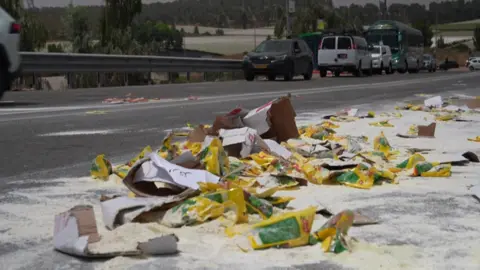
Aid bound for Gaza has been left strewn on roads after the attacks
But after a series of well-documented attacks, some Israelis are fighting back.
Peace activists have taken to tracking their opponents’ movements on social media and making sure they’re present at key crossing points.
At Tarqumiya checkpoint, where lorries enter Israel from the southern West Bank, members of the group Standing Together are now mounting regular vigils.
Tarqumiya was the scene of one of the most dramatic recent attacks.
“People in Gaza are starving and aid should get to Gaza,” said Suf Patishi, one of Standing Together’s founding members.
“Israeli society should say in a loud and clear voice that we are opposed to these acts,” he said of the recent attacks on convoys.
“It’s not a lot to ask, not to die from hunger, you know.”
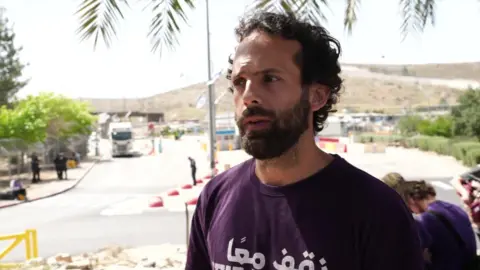
Suf Patishi is the founder of Standing Together, a group that tries to protect aid convoys
The group brings together Jews and Arabs from all over Israel.
For Nasser Odat, an Israeli Arab from Haifa, coming to Tarqumiya provided a welcome opportunity to feel useful, after more than seven months of helplessly watching the war in Gaza.
“I feel very empowered,” he said. “Now, finally, I have something to do to help. To help these people that are starving.”
As the peace activists sheltered from the fierce sun under palm trees at the centre of a roundabout, passing lorry drivers waved and sounded their horns in gratitude.
A small group of right-wing demonstrators arrived but were heavily outnumbered by Mr Patishi’s volunteers.
The two sides debated their differing positions in discussions that became increasingly heated.
Police officers stood nearby, ready to keep the opposing camps apart if it came to blows.
The peace activists have accused the police, under the control of National Security Minister Itamar Ben-Gvir, one of the most hardline members of Benjamin Netanyahu’s government, of doing little to stop the attacks.
They say there’s evidence that settlers are receiving help from the authorities and point to text messages in which groups organising attacks on aid lorries solicit and receive help from the police and army.
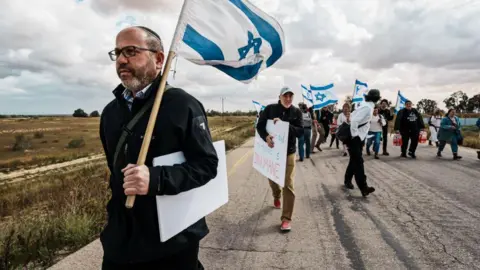
Other Israeli groups have meanwhile tried to block border crossings to prevent aid reaching Gaza
“A lot of times the police were in the areas when attacks occur, but they didn't have someone to push them to act,” Mr Patishi said.
“And it's very sad because the police should keep the law.”
As lorries drove by, two young women waved an Israeli flag but stopped short of trying to stop the traffic.
The two, who asked to be identified as Ariel and Shira (not their real names), explained why they felt it was important to be there.
“We would prefer that we don’t have to do the blockages, honestly,” Ariel said.
“I don’t like ransacking things. It’s not one of my favourite hobbies. But we prefer that to the death of our friends and family, which is what happens the longer this war drags on."
Both women recognised that there might be starvation in Gaza, but were convinced that Hamas was stealing and stockpiling aid rather than distributing it to people in need.
And they were not worried about what sort of image of Israel was being projected by the scenes of aid lorries being stopped, ransacked and set on fire.
“It’s time to stop caring what everybody else thinks,” Shira said, “and do what’s necessary to protect my life, to protect my family.”
As for the police, Ariel was dismissive.
“They aren’t going to interfere if they aren’t certain they’re able to shut it down,” she said. “They’re not going to start something they can’t finish.”
Three Injured in the U.S. Crew Offloading at Gaza Aid Pier
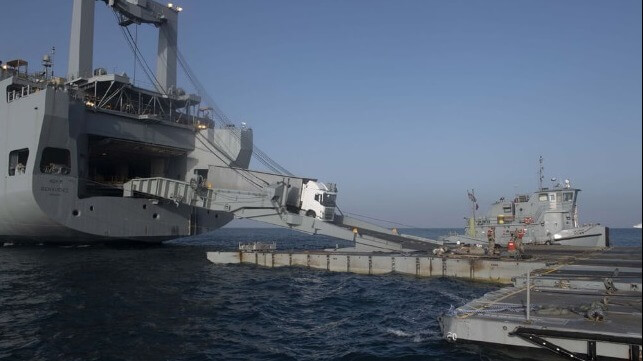
Three members of the crew working at the Gaza aid pier were injured in an unloading accident according to a report first on ABC News. U.S. Central Command confirmed the incident with “non-combat-related injuries” to ABC News without providing specific details.
According to various sources, ABC is reporting it was a forklift accident while the MV Roy P. Benavidez, a Ro/Ro cargo ship, part of MARAD’s Ready Reserve Fleet, was offloading on the dock. The report said all three individuals were transferred to an Israeli hospital as they required more care.
ABC is quoting Vice Adm. Brad Cooper, a CENTCOM deputy commander, saying that two of the individuals later returned to duty. The third individual is reported to be in critical condition and remains at the Israeli hospital. The ship is crewed by contracted merchant mariners, and it was unclear if it was this civilian crew or as ABC which referred to them as “service members.”
CENTCOM released a picture on May 18 which showed the Benavidez on the dock with large trucks carrying supplies ashore. According to the report 150 metric tons of supplies were delivered from the ship to the beach transport point on May 22. A further 185 metric tons was distributed from the transfer point to the U.N. warehouse.
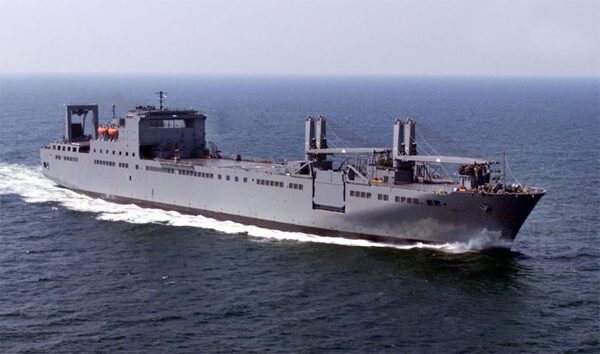
Benavidez was delivered to the U.S. Navy in 2003 (Northrop Grumman photo)
Completed in 2003, the Benavidez was the last of seven strategic sealift ships built by Northrop Grumman Ship Systems for the U.S. Navy. The ship which had previously been deactivated, left Newport News, Virginia on March 21, 2024, as part of the Joint Logistics-Over-the-Shore, or JLOTS mission. The ship is a dry cargo surge sealift carrier capable of transporting up to 380,000 square feet of containerized cargo and rolling stock between developed ports.
Aid groups have been critical of the operation since it began saying that it had a limited capacity and was risky. CENTCOM with US AID however is emphasizing the contribution of the pier in its first week of operation. As of May 22, they reported a total of 820.5 metric tons was delivered by sea to the beach transfer point. A total of 506 metric tons they said has been distributed to the U.N. warehouse. The Republic of Cyprus along with the United Nations, is helping to coordinate the effort with CENTCOM emphasizing international donors, including the UAE, the United Kingdom, Romania, and the European Union.
Israel army: We warned Netanyahu before Hamas attack
May 24, 2024 
Relatives of Israeli hostages in Gaza and their supporters demonstrate demanding the government sign a ceasefire and prisoner exchange agreement in front of Prime Minister Benjamin Netanyahu’s house in Gaza, on May 13, 2024 [Saeed Qaq – Anadolu Agency]
The Israeli army’s Intelligence Division says it warned Prime Minister Benjamin Netanayahu prior to 7 October that an attack was to be carried out by the Palestinian resistance in Gaza.
The army revealed yesterday that it had sent four warning letters between March and July 2023 “concerning how Israel’s ‘enemies’ perceived the societal divides in the State of Israel and their effect on Israel and the IDF in particular,” the Jerusalem Post reported.
However the Prime Minister’s Office denied that the letters contained details of threats, saying: “Not only is there no warning in any of the documents about Hamas’s intentions to attack Israel from Gaza, but they actually contain completely opposite assessments.”
Adding that the second letter stated that “Hamas is not interested in escalation and seeks an agreement with Israel.”
Netanayhu has repeatedly said he had not received warning about any attack from security forces. But said in an interview this month that he holds himself responsible for the 7 October failure, adding: “I think we have to examine how it happened. What was the intelligence failure?”
Palestinian factions demand serious effort to execute top UN court's decisions on Israel
Rafah crossing must be completely opened, says National and Islamic Forces Committee
25/05/2024 Saturday
AA
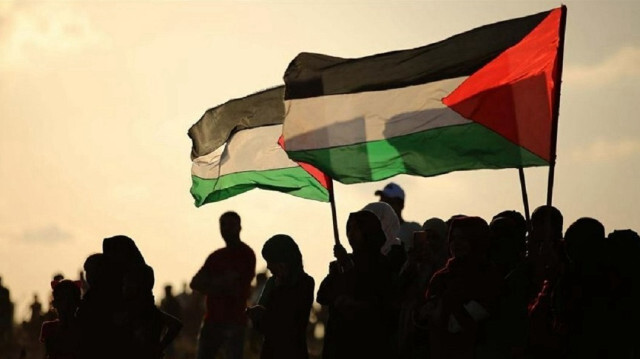
Palestinian factions on Saturday urged the prompt and genuine implementation of the International Court of Justice's (ICJ) decisions, stressing the need to avoid delays or obstructions that could absolve Israel of its responsibilities.
The National and Islamic Forces Committee, which represents the majority of Palestinian groups, issued a statement in support of the top UN court decision.
"The fascist aggression against the city of Rafah and all parts of the Gaza Strip and the Palestinian Territory must be stopped, and the Nazi occupation army must withdraw completely,” the committee said.
It urged all parties to "seriously and genuinely work to implement the decisions of the International Court of Justice, without procrastination or delays that could absolve the occupation of its responsibilities under various pretexts."
It asked all parties to ensure “the complete withdrawal of the Israeli army from the Rafah crossing” and to reopen it as a “solely Palestinian-Egyptian crossing in accordance with the agreed-upon mechanisms.”
The committee cautioned "against any attempts to circumvent the decision of the International Court of Justice or legitimize the siege and occupation."
On Friday, the ICJ reaffirmed its previous orders and indicated further measures including an end to military operations in the southern city, maintaining the Rafah border crossing open and allowing access for investigators to the blockaded enclave.
ICJ President Nawaf Salam said the situation in Gaza had deteriorated since the court last ordered Israel to take steps to improve it.
Israel continued its brutal offensive on Gaza despite a UN Security Council resolution demanding an immediate cease-fire.
More than 35,800 Palestinians have been killed in Gaza, the vast majority being women and children, and nearly 80,300 others injured since October following an attack by Hamas.
More than seven months into the Israeli war, vast swathes of Gaza lay in ruins amid a crippling blockade of food, clean water and medicine.
The EU must define its stance on the International Court of Justice's call on Israel to halt its Rafah offensive, Borrell said.
The European Union's foreign affairs chief, Josep Borrell, has said that the bloc faces a "difficult" choice between its support for the rule of law and its support for Israel, just minutes after the ICJ ruled Israeli forces should halt their offensive in Rafah.
Speaking during a European University Institute (EUI) event in Florence, Borrell said: "Let's see which is going to be the action of the European Union to the ruling of the International Court of Justice that has been issued today, which is going to be our position?"
"We will have to choose between our support to the international institutions and the rule of law, or our support to Israel, and both things is (sic) going to be quite difficult to make compatible," he added.
It came just minutes after the Hague-based top UN court called on Israel to "halt its military offensive in Rafah", citing that the Palestinian people were at an "immediate risk".
The UN estimates that some 1.4 million Palestinians are sheltering from war in the southern Gazan town, which Israel claims is Hamas' last stronghold.
Borrell also acknowledged that the EU's decision-making when it came to its response to the war in Gaza had been too sluggish due to deep rifts between EU capitals' stance on the conflict.
He called for a change to the EU's decision-making processes on foreign policy, which requires the unanimous backing of all 27 leaders.
Hungary has notably blocked or delayed key EU initiatives in response to the war, including sanctions on violent Israeli settlers as well as a joint communication calling on Israeli Prime Minister Netanyahu to abandon plans to invade Rafah.
Borrell's opening speech was also interrupted by pro-Palestinian protesters who slammed the EU's response to the devastation and loss of life in Gaza, to whom the EU's top diplomat responded: "I understand perfectly the concern being expressed."
Recognition of Palestine is 'contrary' to supporting terrorism
Reacting to the scathing Israeli criticism of Spain, Ireland and Norway's decision to recognise the State of Palestine, announced Wednesday, Borrell firmly rebuked foreign minister Israel Katz's accusation that the move would send a message that "terrorism pays."
"For me one thing is clear, recognition is not supporting Hamas," Borrell said. "And on that, I have to really contest the positions expressed by the Israeli government saying that recognition is a gift to Hamas, or supporting terrorism. Just on the contrary."
"It's unfounded, completely unfounded and unacceptable to say that recognition - be or not counter-productive - is a matter of giving gifts to Hamas or expressing anti-Semitism, nothing of that."
He affirmed that the recognition was designed to bolster the EU's support to the Fatah-led Palestinian Authority, seen as a counter-movement to Hamas in the Palestinian territories.
He described the Palestinian Authority as the "nucleus of a future possible Palestinian state."
Borrell named Slovenia as one of a group of EU countries that could follow Spain and Ireland's path, but acknowledged that other member states believe that the recognition comes at a "counterproductive" moment.
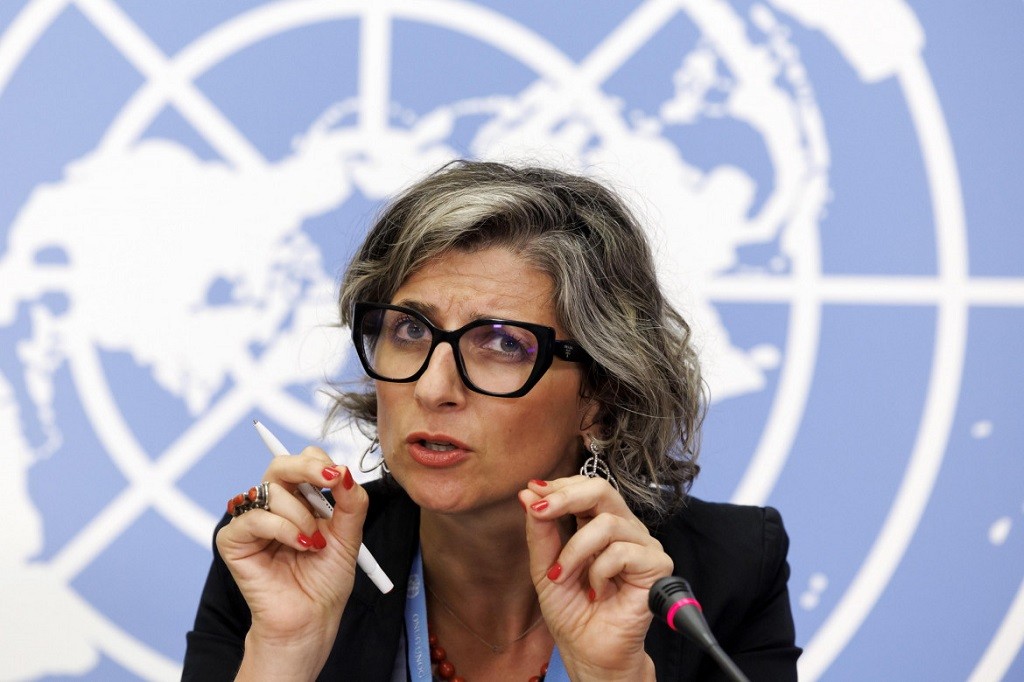
UN rapporteur: "Israel" will not stop its madness until international community stops it
[25/May/2024]
NEW YORK May 25. 2024 (Saba) - The United Nations Special Rapporteur for the Occupied Palestinian Territories, Francesca Albanese, stressed that Israel will not stop its madness in the Gaza Strip until the international community stops it.
Albanese said in a statement published on the X platform last night that the occupation entity intensified its attacks on the city of Rafah, after the International Court of Justice ordered it to stop its military operation.
The news she receives from people trapped in the southern Gaza Strip city is "horrific", she said. It called for imposing sanctions on this entity, banning the supply of weapons, and suspending diplomatic relations with it, until it complies with the decision of the International Court of Justice.
E.M
Israeli army arrests 180 displaced Palestinians from school used as shelter in Jabalia refugee camp
Army began wide-scale military operation against camp May 12
25/05/2024 Saturday
AA
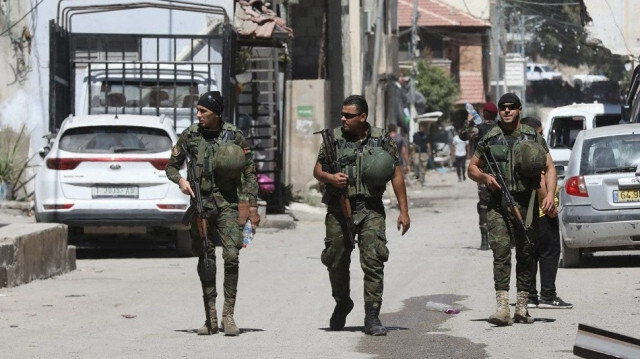
The Israeli army arrested 180 displaced Palestinians from a school used as a shelter in the Jabalia refugee camp in the Gaza Strip, amid an ongoing military campaign in the camp, according to a prisoner group on Friday.
"The occupation forces arrested some 180 displaced from the Al-Harthani school in the northern Gaza Strip during ongoing aggression," the Prisoners Media Office NGO said in a statement.
The statement, however, did not provide details on how or which day the Palestinians were arrested.
Witnesses told Anadolu that the Israeli army targeted several shelters in the camp and arrested dozens of people.
On May 12, the army started a wide-scale military operation against the camp during which it destroyed homes and forced residents to flee areas in the camp.
Israel continued its brutal offensive on Gaza despite a UN Security Council resolution demanding an immediate cease-fire.
More than 35,850 Palestinians have been killed in Gaza, the vast majority being women and children, and nearly 80,300 others injured since October following an attack by Hamas.
More than seven months into the Israeli war, vast swathes of Gaza lay in ruins amid a crippling blockade of food, clean water and medicine.
Israel is accused of “genocide” at the International Court of Justice, which has ordered Tel Aviv to ensure its forces do not commit acts of genocide and take measures to guarantee that humanitarian assistance is provided to civilians in Gaza.
Italy to resume funding for UN agency for Palestinian refugees
Published: 25 May 2024 -

Italy's Prime Minister Giorgia Meloni (front) welcomes her Palestinian Authority counterpart Mohammed Mustafa prior to their meeting at Palazzo Chigi in Rome on May 25 2024. (Photo by Filippo Monteforte / AFP)
AFP
Rome: Italy said Saturday it would resume funding for the United Nations agency for Palestinian refugees (UNRWA), as Palestinian Prime Minister Mohammed Mustafa made a visit to Rome.
"Italy has decided to resume financing specific projects intended for assistance to Palestinian refugees," Italian Foreign Minister Antonio Tajani said.
Mustafa met with Tajani and then with Italian Prime Minister Giorgia Meloni on what was his first trip to Europe since being appointed by Palestinian president Mahmud Abbas in March.
Tajani said he had informed Mustafa that Rome had "arranged new funding for the Palestinian population, of a total of 35 million euros ($38 million)".
"Of this, five million will be allocated to UNRWA," he said.
The remaining 30 million euros will be allocated to Italy's "Food for Gaza" initiative in coordination with UN aid agencies.
U.N. chief ‘trusts’ Israel will comply with ICJ order to halt Rafah assault
Israeli officials indicated they would ignore the International Court of Justice’s ruling that Israel “immediately halt” its military operation in Rafah.
By Kelsey Ables and Victoria Bisset
Updated May 25, 2024
The International Court of Justice ruled Friday that Israel must “immediately halt” its military operation in Rafah, citing “exceptionally grave” developments there, in a high-profile rebuke of Israel’s war in Gaza.
U.N. chief António Guterres “trusts” that Israel will comply with the ruling, his spokesman Stéphane Dujarric said Friday. Although Guterres “has no crystal ball,” Dujarric noted that U.N. member states have a duty under the body’s charter and the World Court’s statutes to abide by the decision.
Orders from the ICJ are legally binding but can be difficult to enforce. Israeli officials indicated that they would continue military operations in Rafah and said allegations by South Africa, which brought the case to the ICJ, that Israel is committing genocide in Gaza are “false, outrageous and disgusting.”
Immediately after the ruling, there were no signs of a pause in fighting, with Palestinians reporting strikes in Rafah while video and images emerged of smoke rising over the city. In a Saturday update, the Israel Defense Forces said “operational activity in specific areas of Rafah” continued on Friday, including “close-quarters combat.”
It is not clear how the ICJ ruling will impact the situation on the ground in Rafah. The court’s orders must be enforced by the U.N. Security Council, whose five permanent members, including the United States, can veto resolutions. And even among the 13 of the 15 judges who voted in favor of a provisional measure, there were some differences in opinion over how the ruling should be interpreted.
South African judge Dire Tladi wrote that the continuation of Israeli military operations in Rafah, with the exception of “legitimate defensive actions ... to repel specific attacks,” were not permitted under the order. However, Romanian judge Bogdan-Lucian Aurescu wrote that the order to halt Israel’s military offensive in Rafah only applied “to the extent that it ‘may inflict on the Palestinian group in Gaza conditions of life that could bring about its physical destruction in whole or in part.’”
At one point, the majority of Gaza’s population had sought refuge in Rafah, but more than 800,000 have fled the southern city in the past few weeks, according to the U.N. humanitarian agency. Israel’s military operation in the city is taking place despite widespread global criticism.
The Biden administration has not formally responded to the ICJ ruling. The administration has straddled a delicate line on Israel’s military actions in Rafah, stressing its opposition to a full-scale offensive there while also stating that its “red line” has not been crossed — a position that has brought it criticism from lawmakers on both sides.
Friday’s ruling is part of a broader case brought by South Africa, that accuses Israel of violating the Genocide Convention. Israel has rejected the genocide charges and has said its military action is “in accordance with its right to defend its territory and its citizens” and does not breach international law.
South Africa welcomed Friday’s ruling. In a statement, South African President Cyril Ramaphosa said Palestinians are facing “collective punishment for something for which they have no individual responsibility.”
A spokesperson for Egypt’s Foreign Affairs Ministry called the decision a “positive step” toward safeguarding the rights of the Palestinian people.
The European Union’s foreign policy chief, Josep Borrell, wrote on social media Saturday that ICJ orders are binding and must be “fully and effectively implemented.”
Here’s what else to know
Four U.S. Army vessels supporting the U.S.-built pier in Gaza were impacted by rough seas overnight, U.S. Central Command said Saturday. Two of the vessels are beached on the Israeli coast, while two others are anchored by the pier, according to Centcom. “No injuries have been reported and the pier remains fully functional,” Centcom added in its statement.
Italy’s Foreign Minister Antonio Tajani agreed to reinstate funding to the U.N. agency for Palestinian refugees, Italian media reported Saturday, months after a number of countries suspended contributions over Israeli allegations that several of UNRWA staff members took part in the Hamas attack on Israel on Oct. 7. According to Italian media, Tajani said after a meeting with the Palestinian Authority’s Prime Minister Mohammad Mustafa that his government had approved 35 million euros ($38 million) in additional funding for Palestinians, including 5 million euros for UNRWA, which would be subject to “rigorous checks.”
Egypt agreed to temporarily lift its ban on aid passing through its territory that would enter Gaza via Israel, Cairo and Washington announced Friday. The Rafah crossing between Gaza and Egypt has been the main thoroughfare for aid during the war, but that flow has virtually ceased since Israel took control of the Palestinian side earlier this month. Egypt responded by prohibiting international humanitarian aid from transiting its territory on its way to the Israeli-controlled Kerem Shalom crossing, the only other entry point into southern Gaza.
The U.N. agency for Palestinian refugees warned that the border crossing closures have already had a serious impact. “Certain laboratory and dental items and vaccines are out of stock,” with “antibiotics for children and anti-epileptic drugs” also affected, as disruptions at the crossings meant U.N. health centers received no medical supplies for 12 days straight, UNRWA said in a Friday update.
The U.N. Security Council on Friday adopted a resolution condemning rising attacks on humanitarian workers and agency personnel. The resolution, which did not name any country in particular, demands that “all parties” to a conflict comply with their obligations under international humanitarian law. It passed with 14 members voting in favor and Russia abstaining.
At least 35,903 people have been killed and 80,420 injured in Gaza since the war began, according to the Gaza Health Ministry, which does not distinguish between civilians and combatants but says the majority of the dead are women and children. Israel estimates that about 1,200 people were killed in Hamas’s Oct. 7 attack, including more than 300 soldiers, and says 282 soldiers have been killed since the launch of its military operation in Gaza.
Cate Brown, Hazem Balousha, Jarrett Ley, Louisa Loveluck and Ellen Francis contributed to this report.

No comments:
Post a Comment